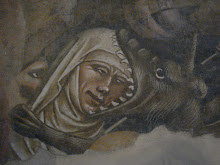I was reading my local newspaper the other day, and came across an article about Michelle Obama and the politics of being First Lady. It was an interesting article, not least because I am presently working on my MA thesis on the Roman imperial cult, seeking a culturally resonant explanation for the deification of imperial women in Rome during the second century AD other than the usual "it was all propaganda." It seems to me that even a casual student of ancient Rome sees the obvious parallels between the modern American empire and that of ancient Rome. Hopefully we all recognize imperialism when we see it. What struck me about this article, though, was how many points of similarity there were between what I have been reading in the course of my research and the things being said about Michelle Obama's role in the White House. The First Lady isn't supposed to be too obviously involved in politics, in order to appear not to be influencing her husband's policy as president, for example. Interesting, because Rome's emperors were frequently criticized if they allowed the women of their households to become too powerful, have too much influence, or be too visible in public life. Women, even very capable, intelligent, and politically saavy ones, had to tred lightly for the sake of their husbands' reputations. It didn't do for the emperor of the known world to look like a wuss because it was suspected that his woman was giving him instructions - or even advice - behind closed doors. Funny that now, a couple thousand years later, the most recent first lady is in exactly the same situation.
Sure, she's encouraged, now, to be active in public life but she still has to be careful about seeming to be involved in the same political sphere as her husband. She musn't seem to be too powerful, politically ambitious , or involved in advising him. Michelle Obama has, for now it seems, given up her legal career. Her self-declared roll now is "First Mother" - tending to the wifey duties of home and household. Just like a good Roman matron, she is hunkering down into the traditional woman's role of supporting her man without offending national sensibilities by allowing a whiff of participation in his leading the nation. Really? Is female power still such a threat to men? In ancient Rome, first ladies hosted dinner parties for their peers, were involved in charities that benefitted the community and participated in religious rites. They were patronesses and had what we might call "causes," just like a modern first lady. And yet their potential influence as women so close to the seat of male power caused an incredible, largely negative, reaction from the men who documented Roman history. Not that they had to quit their jobs or anything, because they didn't have what we'd call jobs, but they walked a similar line and I am frankly astounded that these are still issues. Reading the history of Roman women is very difficult because one has to try and separate the individuals out from the invective and stereotypes. I wonder, will it be any different with this first lady? Why are these issues still issues? There is this myth we call "women's liberation" that needs closer examination, but in order to grasp why it is such a myth, and maybe even answer why the stereotypes are still so prevalent, people need a stronger sense of history. Somebody should do a study, and find the, inevitably many, fascinating points of comparison and contrast across time in the roles of first ladies. There is so much here and I don't have time. I just thought I'd bring it up.
24 January 2009
Subscribe to:
Posts (Atom)



